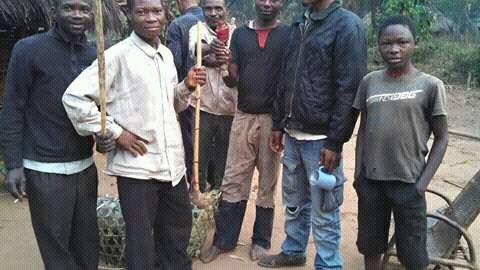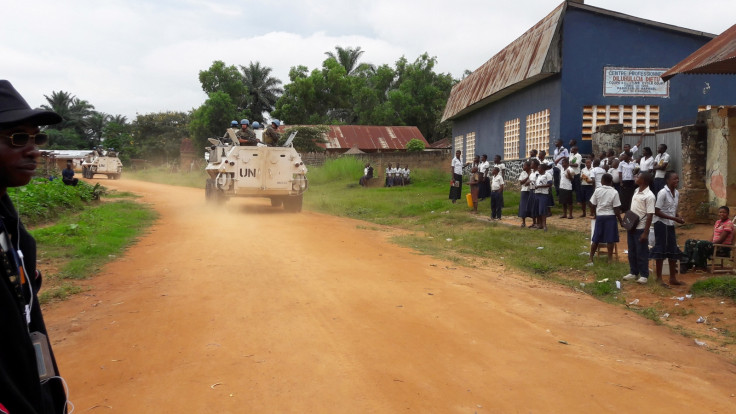DRC unrest: Catholic Church slams 'killings and plundering' by security forces in Kasai
Military operation under way in Kananga city to dislodge suspected Kamuina Nsapu militiamen.
The Catholic Church has condemned the "killings and plundering" allegedly committed by security forces in the Democratic Republic of Congo (DRC)'s restive Kasaï-Central province.
Kasaï, in the heart of the DRC, has been plagued by violence between the Congolese security forces and a local militia, Kamuina Nsapu, who are seeking to avenge the death of their leader, who was killed in Tshimbulu by Congo's security forces in August 2016.
Besides serious abuses attributed to Kamuina Nsapu, the United Nations (UN) has reported the disproportionate use of force by government security forces in their response to the situation.
On 30 March, a local branch of the Catholic Church in the capital of impoverished Kasaï-Central province, Kananga, published a statement in which it described the "carnage of loyalist forces" in the city.
In the communique, Father Bruno Ntumba, coordinator of the diocesan commission of social communication, deplored the "unacceptable behaviour of law enforcement agencies" against the innocent Congolese population.
"According to all the crossed evidence, the security forces enter the homes of the local residents and ask for money. You give and your life is spared; you do not give and you are shot at point blank range," Ntumba said.
The cleric explained that soldiers maintain that those killed were hiding Kamuina Nsapu militiamen in their homes and failed to denounce them.

Clashes between the militia and the security forces have expanded to neighbouring Kasaï and Kasaï-Oriental provinces, and have displaced hundreds of thousands of people. The UN's Office for the Coordination of Humanitarian Affairs (OCHA) this month warned that 600,000 people are now in need of emergency humanitarian assistance in the region.
Referring to the growing crisis, Ntumba said the police force's official door-to-door operation to find possible Kamuina Nsapu militiamen in Kananga is plunging the city into "total desolation and a very fragile humanitarian situation". He called for an immediate halt of the operation, especially in "distressed" communes of Nganza, Katoka, Kananga and Ndesha.
"That is totally unacceptable. The population fled into the bush. We must seek and secure this population, to restore its confidence. We are dealing – excuse me, the term is too hard – with bandits," Ntumba added. "People have lost a lot of their belongings. There are people who have lost their husbands, wives, parents ... It's really a desolate situation."
Following the cleric's comments, local newspaper Le Potentiel on 31 March said the Church was describing "a population in distress and doomed to a genocide orchestrated in broad daylight by the security forces deployed in the (...) provinces of the Kasaï."

Deaths unconfirmed, says local official
UN-funded Radio Okapi reported local residents stayed indoors while the security forces carried out the operation, during which gunfire was heard.
"Schools remained closed, some shops tried to open their doors despite the strong military and police presence," the radio said on 31 March.
"The movement of people fleeing the communes where the forces of law and order operated has decreased and transport has gradually resumed, local sources indicate. The same sources indicate that entire families, mainly from the commune of Nganza, have taken refuge in churches and host families."
Meanwhile, Justin Milonga, the deputy governor of Kasaï-Central province, said that reports of killings and plundering committed by law enforcement agencies in the Nganza commune in Kananga must be taken with reserve.
Milonga told Radio Okapi he was waiting for security services to report back on the situation. "At the moment, the situation is relatively calm; a fragile calmness because we are in a process that requires many steps we need to take to achieve lasting peace," the deputy governor said.
"Anyone can say anything, but I'm telling you that the real report is the one that has to come from our security services and that's the relationship I'm trying to harness. Let me harness it. I can not confirm the deaths until the report of the security services confirms it".
Kasai conflict in numbers
Kamuina Nsapu insurgency arose in 2016
The violence has spread to two neighbouring provinces
By January 2017, 216,000 people were displaced
Some 600,000 people are in need of emergency humanitarian assistance
Over 600 deaths have been reported, according to the Assessment Capacities Project (ACAPS)
In the town of Tshimbulu alone, at least 84 militia members were killed between 9 and 13 February 2017
At least eight mass graves have been discovered in the area since.
© Copyright IBTimes 2025. All rights reserved.






















